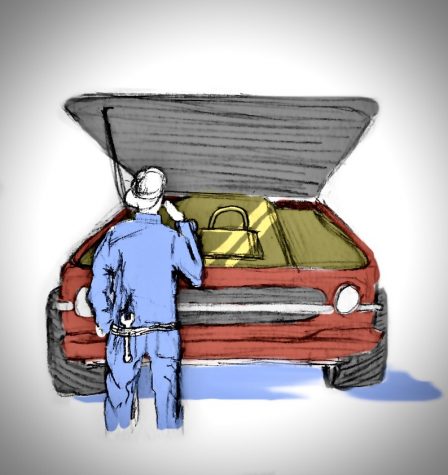OPINION: Do you have the right to repair?

There is a growing movement to limit the power of a corporation in order to protect consumers’ “right to repair.”
Often, when you purchase something like a car or a cell phone, you are only purchasing the hardware itself—meaning the screen, the engine block, etc. You are licensing the software that makes the hardware usable. This forces you to go to the company when something breaks and you need it repaired, as they can put restrictions in place that would prevent you from fixing it yourself. The agriculture industry has become arguably the largest battleground for the right to repair.
It might surprise you to learn that small farmers are now buying up used tractors from almost a half century ago. Why? Because at that time, companies like John Deere™ hadn’t yet restricted the owner’s ability to fix their farm equipment using John Deere™ licensed software.
When you buy a new tractor from somewhere like John Deere™, you’re not only signing up for the use of a nice new tractor, you’re signing up for the biggest headache of your life. On that 1975 tractor a small farmer just bought, when the carburetor floods or the spark plugs die, he just drains the carburetor or swaps in some new spark plugs. If a piston gets bent, he can either straighten it and make do or replace it.
However, if you buy a comparable modern tractor and your spark plugs die, you have to wait a week for a John Deere™ official to come out to your farm, electronically ‘unlock’ the tractor to be worked on, pay him for the trouble, and also you can only put John Deere™ spark plugs, lest the tractor shut down and not run. Yes, the tractor can recognize if you put generic plugs in it and force you to put John Deere™ spark plugs in it.
Many farmers are outraged about this, because if their tractor breaks down during the harvest, they don’t have a week to wait for a John Deere™ official to come out to their farm and repair it for them. It’s literally their livelihood, and John Deere™ is just using them to make a quick buck.
However, although John Deere™ has been feeling a lot of heat from lots of different groups, their stock, while subject to many fluctuations, has done fairly well since 2018. John Deere™ is essentially getting away with ripping off smaller farms because huge farming corporations can afford to pay the extra fees and are willing to. Small farms are already dying because larger farms are able to be more profitable due to economies of scale (producing huge amounts of a product and thereby lowering price), and this is only hurting them further.
Everyone should fight for the right to repair. It affects all people, not just farmers and their tractors. Your iPhone? You can’t fix it, according to the terms and services you signed without reading. If you do, you risk voiding warranties and your Apple Care.
It doesn’t matter what you’re fixing—something as simple as replacing the battery in your phone can void it—even if you pay a third party to do so. Apple wants you to pay them to fix it, which makes sense; it’s good for Apple. But it’s bad for the consumer; you’re being forced to pay extra for a very simple repair.
We don’t even truly own our own phones anymore. It used to be the case that the hardware was yours, and it was fairly simple to unscrew the back panel and do minor repairs. Now, many new phones are built so that even if you wanted to, you couldn’t open it up in order to fix it.
In doing so, companies have begun taking away even our ownership of the hardware, and we may soon not even own the hardware our devices are made of.
In short, the right to repair is one of the fundamental issues of our time, and one of a few major problems caused by the technological boom of the 21st century. We shouldn’t leave this to farmers and activists. Everyone is affected by the right to repair and we should all fight for the ability to cheaply and legally fix our own property.






